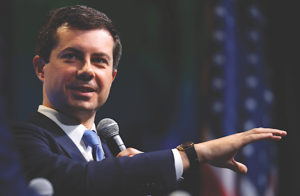For older LGBT people, the rise of Pete Buttigieg to the front ranks of Democratic candidates for president inspires awe. Having grown up at a time when homophobia was the overwhelming norm, it’s difficult to imagine that an out gay candidate would even be in the running — let alone get this far. Polls of voters in the upcoming Iowa caucuses and New Hampshire primary actually show Buttigieg surging ahead. Momentum seems to be on his side. And then there’s the primary election that follows soon after, in South Carolina, where support for his candidacy is virtually nil.

Buttigieg is not popular with African-American voters, and African-American voters are a crucial demographic in Democratic politics. The reason blacks haven’t joined the Buttigieg juggernaut, many presume, is homophobia. Black churches, which have historically fueled the civil rights movement and are integral to African-American political power, have not been enthusiastic supporters of LGBT rights. Many queer people assume that Buttigieg’s black detractors will be the cause of his downfall in the primary, and that homophobia is behind it.
But is that assumption justified? Are black churches, especially in the South, any more homophobic than white churches? Aren’t black voters wary of Buttigieg because of his record with the African-American community in South Bend, Ind., where he is mayor? Isn’t it possible that black voters don’t yet see Buttigieg’s candidacy as representing their interests? Don’t they have the capacity to change their minds?
It might be instructive to remember that in 2008, when Barack Obama was competing with Hillary Clinton for the Democratic nomination, black voters did not automatically support him, either. Michelle Obama, in early interviews, said that black folks didn’t yet know Barack, but they would come around. And she was right. There was a hesitancy to support a young, inexperienced candidate with unlikely prospects when so much was at stake. The same might be said of Buttigieg in 2020.
There’s an ugliness to presumptions of homophobia, especially in light of the LGBT community’s history of racism. Being part of a class of people who have suffered from discrimination doesn’t free you of moral responsibility. If you are queer and white, it’s helpful to re-examine your own history with racism before judging the decisions of black voters.
Growing up in the suburbs of New York City, I saw racism fairly regularly in my liberal Jewish milieu. My parents had a portrait of Martin Luther King Jr. in our den, but that didn’t stop my grandmother from washing the black maid’s dishes twice. In the 1970s, Fair Lawn, N.J., my hometown, was 99 percent white and mostly middle-class, and across the Passaic River, the city of Paterson was largely black and Puerto Rican and poor. My high school of nearly 2,000 kids had one black student. Racist segregation breeds racist thoughts and deeds, even among those who consider themselves progressive, including many Jews, who have been persecuted for centuries and should know better.
When I came out, in college in New England in the 1970s, I observed racism at gay bars and clubs. It’s heartbreaking and demoralizing to see someone refused entry to a club because he is black and dressed in a way that a bouncer doesn’t like. I saw the same thing happen in gay bars and clubs in New York City when I moved there at the dawn of AIDS. There were no “whites only” signs, but it was not unusual to see nearly all-white crowds at the most popular hangouts in a city with millions of people of color.
Another egregious example: in the 1980s, the center of gay life in New York moved from Christopher Street in Greenwich Village to Eighth Avenue in Chelsea, a half-mile north. It was clearly white flight. It started when Christopher Street began attracting crowds of young blacks and Latinos, lured by the freedoms the gay ghetto afforded. The racial shift began subtly, then became decisive. White crowds vanished. The scene had moved uptown.
Although it was not common to hear overt racism — and the N-word — in the gay white-collar circles to which I belonged, it nevertheless happened. Guiltlessly, with a smile. And it has happened here on the Outer Cape. My husband and I have dropped friendships as a result.
I was curious about the experience of LGBT people of color in Provincetown, and among those I spoke to for this column, the gist was this: even though the tourists who come here are mostly white, Provincetown is a haven of tolerance, both in terms of race and sexuality.
“I live in Acton, Mass.,” says Jonta N. Davis, who is African-American and works with Girl Power Productions, which organizes Women of Color Weekend and other lesbian events. “When I see a cop car in Acton, most likely I will be pulled over. Here, in P’town, when I’m selling tickets at the firehouse, the police will come up to me and we’ll have a friendly chat. I feel protected and sheltered rather than feeling on edge.”
The lesson is this: if bigotry is omnipresent, it’s also relative. And politics, first and foremost, is about self-interest. When self-interest is obscured by prejudice, everyone suffers. There are LGBT voters who support Trump, and there are people of color who won’t support Buttigieg because he’s gay. But let’s give groups of voters the benefit of the doubt. For Buttigieg to succeed in convincing Democrats of all stripes that he’s their choice, he has to prove that it doesn’t matter whether he’s gay or white or young. Or male. He just has to be the best.
